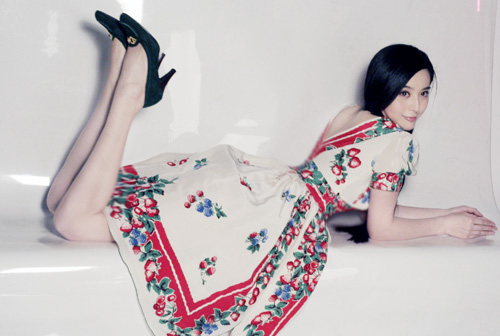Have you ever heard of Fan Bingbing? Unless you’re a regular on the Chinese television circuit, the chances you have are probably slim.
In China, however, where Fan Bingbing is one of the country’s biggest stars, she’s been number 1 on the Forbes China Celebrity list for three years running. She has more than 33 million followers on Weibo, sometimes called China’s Twitter, and there’s even a Barbie in her likeness. In other words, she’s one of the most well-known superstars (in every sense of the world) in one of the largest countries of the world.
While it’s not apparent how many endorsement deals she has, the official Xinhua news agency has estimated that at one point three years ago, it was more than 50. And when Ms. Fan released a selfie on Weibo announcing her relationship on May 29th, she posted a theoretically simple photo of her and her new boyfriend wearing white shirts against a plain background with the caption “us.” The post has been shared 1.6 million times, and generated 6.6 million likes. The viral capacity of her social media is astronomically enormous, and she’s no fool: Fan Bingbing is certainly using this audience to her advantage.
AdAge reports the quiet genius of her selfie. First, Mr. Li (the new boyfriend) posted the selfie, and to retweet it, Ms. Fan used Lenovo’s Moto X Phone; Lenovo had announced her endorsement deal a day earlier. Ms. Fan wore a $530 Cleopatra-style wig from brand Rebecca, who reposted the selfie and added a link to buy the hairpiece online. Finally, L’Oreal used the photo to ask followers to guess which of two L’Oreal lipstick shades she used. One selfie, three brand shoutouts: “She killed three birds with one stone,” Frederic Raillard, co-founder of digital agency Fed & Farid, said to AdAge.
Other brands who weren’t even involved in the selfie let loose their marketing puns and skills to be involved in the conversation. AdAge explains that Ms. Fan’s name, Bingbing, literally means “ice ice.” As such, McDonald’s showed two icy smoothies posed one in front of the other with the caption “Ice Ice Awesome” (in Chinese, the slang word for awesome uses the same character as the word for Mr. Li’s nickname, bull).
Sure, there is no exact number for what the ROI was on this post for these brands. We don’t know how many lipsticks L’Oreal sold or if Rebecca immediately ran out of Cleopatra-style wigs. However, it’s clear that the amount of traffic that was generated is pretty spectacular. “The whole story of her romance and how it unfolded on social media looks and feels like a well-executed campaign,” said Pete Lin, managing director of We Are Social Shanghai.
Celebrity power is still a massive influence, and using influencers on social media for product placement is not an obsolete idea. Alternatively, finding some way to transform your social media into a “cult of the personality” is not a bad idea. People like following real people, lives, faces, and names that they can learn about and journey with. This might mean transplanting a more ambiguous brand identity onto a specific person, spokesperson, or influencer that can represent your brand effectively. Who knows? Maybe your next selfie will be shared 6.6 million times too!




